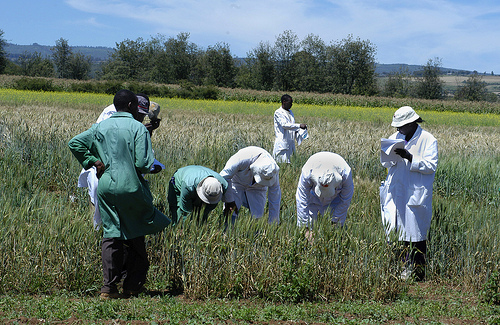Cross posted from the White House Office of Science and Technology Policy blog:
In an exciting opportunity, the G-8 is inviting innovators to apply to present ideas that demonstrate how open data can be unleashed to increase food security at the G-8 International Conference on Open Data in Agriculture on April 29-30, 2013 in Washington, D.C.
Open data is being used by innovators and entrepreneurs around the world to accelerate development, whether it be tracking election transparency in Kenya or providing essential information to rural farmers in Uganda. The G-8 conference will convene policy makers, thought leaders, food security stakeholders, and data experts to discuss the role of public, agriculturally-relevant data in increasing food security and to build a strategy to spur innovation by making agriculture data more accessible. As part of the conference, selected applicants will be invited to showcase innovative uses of open data for food security in either a Lightning Presentation (a 3-5 minute, image-rich presentation on the first day of the conference) or in the Exhibit Hall (an image-rich exhibit on display throughout the two-day conference). Read more »
Tags: Data, Education, Energy, Food Security, G-8, New Alliance for Food Security and Nutrition, Open Data, OpenGov, OSTP, USAID
 Energy, Food Security, International
Energy, Food Security, International

Researchers in Njoro, Kenya, evaluating wheat for resistance to Ug99 in October 2005.
The Journal Nature today published a paper reporting that scientists from USDA’s Agricultural Research Service (ARS), as part of an international team, have completed a shotgun sequencing of the wheat genome. The achievement is expected to increase wheat yields, help feed the world and speed up development of wheat varieties with enhanced nutritional value. Wheat is one of the world’s “big three” crops, along with rice and corn, upon which the world’s growing population depends for nutrition.
Sequencing the genome of wheat was unusually daunting because the wheat genome is five times the size of the human genome, and has 94,000 to 96,000 genes. This sequencing effort involved the identification of essentially all of those genes and mapping their relationship to other genes. Previously, the size and complexity of the wheat genome had been significant barriers to performing a complete analysis, but the scientists overcame that problem by developing a new strategy that compared wheat genetic sequences to known grass genes, such as from rice and barley. Read more »
The Foreign Agricultural Service (FAS) is working with the Nigerian government to help the country ensure its exported and imported food stays safe from farm to fork.
The training is part of FAS capacity-building efforts that support the African Growth and Opportunity Act (AGOA) of 2000, which aims to boost sub-Saharan Africa’s economic growth, spur development and reduce poverty.
At the invitation of the Nigerian government, FAS sent a team of experts to conduct an assessment of Nigeria’s food safety system. They discovered Nigeria needed help developing a program to enforce food safety standards. Read more »
USDA’s food assistance and development programs serve a dual purpose: to meet the immediate needs of hungry people, and to show their countries how to rejuvenate their agricultural sectors and increase their capacity to trade. We accomplish these goals in cooperation with other U.S. government agencies and with private-sector partners ranging from non-governmental organizations to research institutions to agribusinesses. And we are always looking for ways to be more effective.
So this week, at the International Food Aid and Development Conference (IFADC) in Kansas City, we got back to basics, discussing steps we are taking to operate our international aid programs more efficiently to ensure that program dollars go directly to eliminating hunger and poverty. We focused on how USDA can strengthen our partnerships with academia and international relief and development groups, as well as with local and international companies. After all, these organizations have the know-how and expertise that allows USDA to leverage limited funding to make a broad and enduring impact. Read more »
This post is part of the Science Tuesday feature series on the USDA blog. Check back each week as we showcase stories and news from the USDA’s rich science and research portfolio.
As part of the U.S. government’s global hunger and food security initiative called Feed the Future, USDA is building collaborative scientific partnerships with nearly a dozen organizations that will help U.S. and African goat producers enhance goat breeding and productivity.
Feed the Future is part of a multilateral effort launched at the L’Aquila World Summit on Food Security in 2009 to accelerate progress toward the Millennium Development Goal of halving the proportion of people living in extreme poverty and suffering from hunger by 2015. The program enables affected governments and their people to take the lead in developing and implementing food security solutions. These “country-driven” strategies give ownership and accountability, while tackling the root causes of hunger and poverty. Working with the U.S. Agency for International Development (USAID), USDA offers strong competencies in capacity development, food assistance, research and technology transfer in support of Feed the Future. Read more »
This post is part of the Science Tuesday feature series on the USDA blog. Check back each week as we showcase stories and news from the USDA’s rich science and research portfolio.
This week marks the 19th year of World Water Day. The United Nations Conference on Environment and Development designated this day as an annual international event focusing on the importance of sustaining and managing fresh water resources. This year’s theme is water and food security. This is such a critical issue to not only to our international friends, but also for U.S. farmers, ranchers, growers, consumers, and conservationists. Read more »

